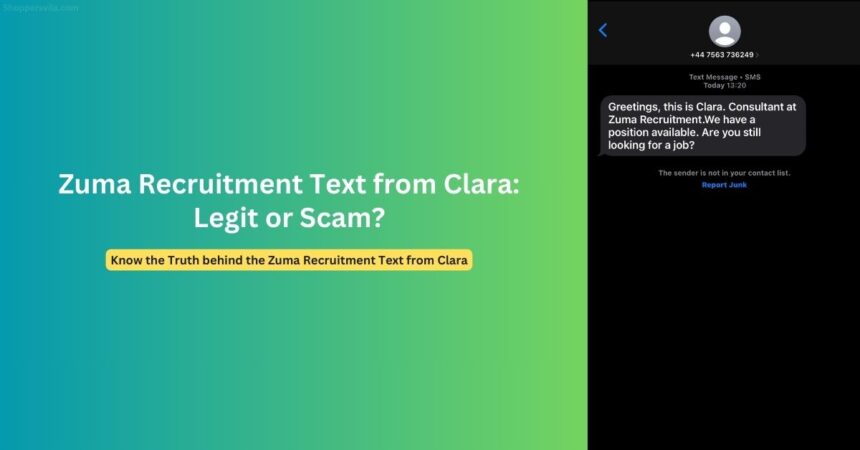In recent months, several individuals across the UK have reported receiving unsolicited text messages from someone named “Clara” claiming to be a consultant at Zuma Recruitment. These messages offer job opportunities with minimal details and request recipients to respond if they’re looking for work. As job seekers navigate an increasingly digital recruitment landscape, these types of messages raise important questions about legitimacy and safety.
Overview of the Zuma Recruitment Impersonation Scam
Zuma Recruitment, a legitimate Data and AI recruitment specialist based in Berlin, Germany, has issued a public warning on their LinkedIn page about these fraudulent messages. According to their notice, someone is falsely using their company name to send text messages from a UK phone number (+44 7563 736249), impersonating a consultant named “Clara” and offering job opportunities to unsuspecting individuals.
The company has explicitly stated: “We do not operate in the UK or employ anyone named Clara.” This clear disavowal confirms that these text messages are indeed fraudulent and have no connection to the actual Zuma Recruitment company, which specializes in Data Science, AI, and Machine Learning recruitment primarily in the Berlin area.
How the Scam Works
The Zuma recruitment text scam follows a pattern common to many job scams circulating today:
- Initial Contact: The scammer sends an unsolicited text message claiming to be “Clara” from Zuma Recruitment, asking if the recipient is looking for work.
- Creating False Legitimacy: By using the name of a real recruitment company (Zuma), the scammer attempts to establish credibility and trust.
- Vague Job Offers: The initial message is deliberately vague about the position available, enticing curious or desperate job seekers to respond for more information.
- Progression of the Scam: If recipients respond, the scammer typically follows up in one of several ways:
- Requesting personal information for “application processing”
- Asking for payment for “background checks” or “training materials”
- Attempting to get financial details under the guise of setting up payment for the position
- Directing victims to suspicious websites that may contain malware
- Disappearing Act: Once the scammer obtains personal information or payment, they often cease all communication, leaving victims without recourse.
Types of Recruitment Scams
The “Clara from Zuma” scam is just one example of the many recruitment scams currently targeting job seekers. These scams generally fall into several categories:
1. Company Impersonation Scams
Scammers pretend to represent legitimate companies, as in the Zuma case. They create fake job listings or send unsolicited messages using the company’s name to appear credible. These scams exploit the reputation of established businesses to trick unsuspecting job seekers.
2. Data Harvesting Scams
These scams focus primarily on collecting personal information that can be used for identity theft. Scammers request details like full name, address, date of birth, and sometimes even more sensitive information like social security numbers or bank details.
3. Advance Fee Scams
In these schemes, scammers demand payment upfront for various supposed services like background checks, application fees, training materials, or work equipment. Once payment is made, the “job” disappears.
4. Task-Based Scams
Some scammers ask victims to complete unpaid “test tasks” or “training assignments” that actually generate value for the scammer. In more sophisticated versions, victims might be unknowingly participating in money laundering or handling stolen goods.
5. High-Salary Remote Work Scams
These scams promise unrealistically high salaries for minimal work, often claiming to be remote positions with flexible hours. The Federal Trade Commission reports that such scams have increased dramatically, with losses jumping from $2 million in 2020 to $61.2 million in 2024.
Fake Clara’s Zuma Recruitment Text Message Patterns and Red Flags
The “Clara from Zuma” texts follow certain patterns that are common in recruitment scams. Being able to identify these patterns can help you avoid falling victim:
Common Patterns in Scam Recruitment Texts:
- Brief, generic greetings (“Greetings, this is Clara”)
- Vague job references with no specific position mentioned
- Unsolicited nature (you never applied or inquired about a position)
- Use of UK mobile numbers (+44) for companies based elsewhere
- Request for immediate response or expressing urgency
- Poor grammar or awkward phrasing (though not always present)
Red Flags to Watch For:
- Messages coming from personal phone numbers rather than corporate email addresses
- Job offers that seem too good to be true (high salary, minimal qualifications)
- Requests for personal or financial information early in the process
- Pressure to make quick decisions without proper interview processes
- Use of messaging apps like WhatsApp instead of professional communication channels
- Reluctance to provide specific details about the job when asked
- Requests for payment of any kind (application fees, training materials, etc.)
How to Identify and Protect Yourself from Fraudulent Zuma Recruitment Texts
As job scams become increasingly sophisticated, protecting yourself requires vigilance and awareness:
1. Research Before Responding
- Verify company existence: Check official websites, social media profiles, and business registries
- Cross-reference contact information: Ensure phone numbers and email addresses match official listings
- Check for scam alerts: Many companies post warnings about scams on their websites or social media
- Search for reviews: Look for reviews or complaints from other job seekers
2. Practice Communication Safety
- Never share sensitive information via text or messaging apps
- Use official channels to contact companies directly to verify job opportunities
- Be wary of interviews conducted entirely via text or messaging apps
- Don’t click suspicious links in unsolicited messages
3. Protect Your Personal Information
- Limit the information you share on public job boards
- Create a separate email address for job hunting
- Never provide financial information or make payments to potential employers
- Consider using a Google Voice number for initial communications
4. Know the Legitimate Recruitment Process
- Professional communication: Legitimate recruiters use professional communication channels
- Thorough interviews: Real jobs involve proper interviews, not just text conversations
- Company email addresses: Official recruiters use company email addresses
- No upfront fees: Legitimate employers don’t charge application or training fees
5. Report Suspicious Activity
- Report scams to relevant authorities (FTC, local consumer protection agencies)
- Alert the impersonated company so they can warn others
- Flag suspicious messages to your mobile carrier
- Share your experience to warn others in job-seeking communities
Frequently Asked Questions (FAQs)
1. Is the Zuma Recruitment Text from Clara Legitimate?
No. Zuma Recruitment has officially confirmed they do not operate in the UK and do not employ anyone named Clara. Any text message from “Clara at Zuma Recruitment” from a UK number is a scam.
2. Is Zuma a Legitimate Recruitment Company?
Yes. Zuma is a legitimate Data and AI recruitment specialist based in Berlin, Germany. Founded in 2021, they specialize in recruitment for data science, analytics, and machine learning positions. Their official website is www.zuma-recruitment.com and their phone number is +49 (0) 30 16634332.
3. Does Clara Work at Zuma?
No. Zuma Recruitment has explicitly stated they do not employ anyone named Clara. This is a clear indication that anyone claiming to be “Clara from Zuma” is impersonating the company.
4. How Can I Verify if a Recruitment Message is Legitimate?
Contact the company directly through their official website or verified phone number (not the number in the message). Check if the company has posted scam alerts. Research the recruitment process for the company in question. Look for professional communication and proper company email addresses.
5. What Should I Do if I’ve Already Responded to a Scam Message?
If you’ve only responded with general information, cease communication immediately. If you’ve shared personal or financial information, monitor your accounts for suspicious activity, report the incident to authorities, and consider placing a fraud alert on your credit report.
Conclusion
The “Clara from Zuma Recruitment” text messages represent a typical example of the sophisticated job scams proliferating in today’s digital landscape. As economic uncertainty and job market competitiveness increase, scammers are exploiting job seekers’ vulnerabilities with greater frequency and success.
Protecting yourself requires a combination of skepticism, research, and awareness of common scam tactics. Legitimate recruiters follow professional processes and never request payment or sensitive information in initial communications. When in doubt, always verify independently through official channels and remember that offers that seem too good to be true typically are.
By staying informed about the latest scam techniques and sharing information with others, job seekers can help create a safer environment for everyone navigating the challenging process of finding employment. The real Zuma Recruitment’s proactive approach in warning potential victims demonstrates how companies can help combat these fraudulent activities and protect both their reputation and unsuspecting job seekers.
Remember: legitimate employers and recruiters want to find the right candidates—they don’t need to send unsolicited text messages or charge fees to consider your application.





























